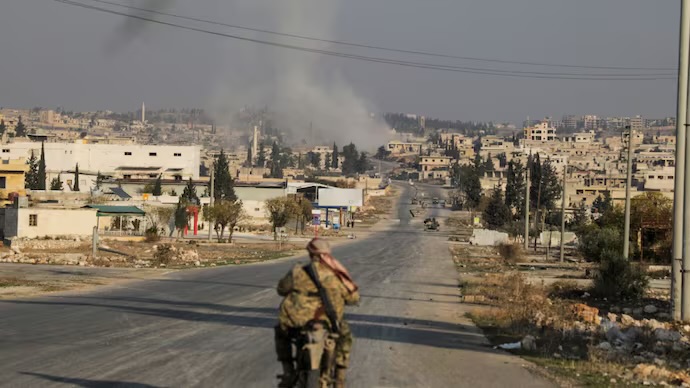In a major escalation, the Syrian military confirmed that rebel forces led by Hayat Tahrir al-Sham (HTS) launched a surprise attack on Aleppo, marking the most intense fighting since 2020. Syrian forces, supported by Russian air power, redeployed to strengthen defense lines, as clashes intensified and civilians were displaced. The conflict underscores renewed instability in Syria’s northwest amid complex regional dynamics involving Russia, Iran, and Turkey.
Insurgent Assault Shakes Aleppo’s Stability
The Syrian military acknowledged on Saturday that insurgent groups had entered key areas of Aleppo city, forcing a significant redeployment of forces. In a statement, the army cited the large number of insurgents and multiple battlefronts as reasons for repositioning to safeguard civilians and soldiers. Rebel forces, primarily led by HTS, launched their ground offensive after detonating two car bombs on Friday. According to Syrian state media, clashes intensified on Aleppo’s western edge.
Turkish news agency Anadolu reported that armed groups had penetrated the city center, although further details were not provided. Syrian state media, SANA, confirmed that at least four civilians, including two university students, were killed during a shelling incident targeting a student residence.
Government Response and Counter-Offensive
The Syrian army announced on Friday that it had repelled parts of the offensive, regaining control of key positions. Russian and Syrian warplanes launched airstrikes targeting rebel-held areas in northwest Syria near the Turkish border, aiming to halt the advance. Reports from Al Jazeera’s Sinem Koseoglu in Hatay indicated that opposition factions had seized control of over 47 villages and were positioned near Aleppo city’s center.
Russian raids, the first on Aleppo since 2016, struck insurgent positions to thwart further gains. Colin Clarke of The Soufan Center noted that while rebels made significant advances, they are unlikely to push beyond northwestern Syria due to their limited resources and focus on governing their current territories.
Humanitarian Crisis and Regional Reactions
The renewed violence has exacerbated the humanitarian crisis in northwest Syria. The United Nations Office for the Coordination of Humanitarian Affairs reported that over 14,000 people, nearly half of whom are children, have been displaced. Residents in affected areas expressed fear of renewed conflict. Sarmad, a 51-year-old Aleppo resident, told AFP that the sounds of shelling and missiles were constant, raising concerns about displacement and safety.
The situation has drawn international attention. Kremlin spokesperson Dmitry Peskov condemned the insurgent advance as an infringement on Syrian sovereignty and emphasized support for the Syrian government. Meanwhile, the Turkish Foreign Ministry called for an end to strikes on Idlib, stressing the need to prevent further instability and protect civilians.
Broader Implications and Regional Dynamics
The offensive highlights broader geopolitical tensions. Iran, a key ally of Damascus, expressed concern over the developments. Iranian Foreign Minister Abbas Araghchi reaffirmed Tehran’s support for the Syrian government during a call with his Syrian counterpart, Bassam al-Sabbagh. Colin Clarke pointed out that Iran’s regional strategy has faced setbacks, suggesting that the country is stretched thin amid various conflicts.
The resurgence of violence comes amidst a fragile ceasefire in southern Lebanon, where Hezbollah recently engaged in fierce clashes with Israeli forces. These overlapping conflicts underscore the complex, interconnected nature of the region’s instability.
Syria’s civil war, which began in 2011, has drawn in major powers including Russia and Iran. The current offensive in Aleppo marks the most significant challenge to President Bashar al-Assad’s control in years, with potential ramifications for Syria’s future stability.


